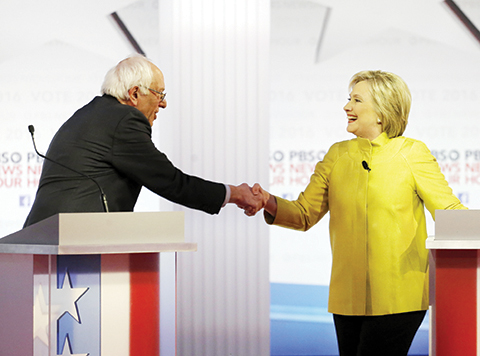 Democratic presidential candidates, Sen. Bernie Sanders, I-Vt, and Hillary Clinton shake hands after a Democratic presidential primary debate at the University of Wisconsin-Milwaukee, Thursday, Feb. 11, 2016, in Milwaukee. -AP
Democratic presidential candidates, Sen. Bernie Sanders, I-Vt, and Hillary Clinton shake hands after a Democratic presidential primary debate at the University of Wisconsin-Milwaukee, Thursday, Feb. 11, 2016, in Milwaukee. -AP WASHINGTON: Bernie Sanders is giving Hillary Clinton a run for her money, $27 at a time. The insurgent Democratic presidential candidate's success with low-dollar online fundraising perfectly complements his denouncement of big money in politics. He's making big money, all right, but in little increments from average people. When Sanders asks his supporters to chip in a few bucks, they respond with enthusiasm. As a result, his campaign is setting ever-higher benchmarks for online fundraising: $6 million in the 24 hours after his New Hampshire victory, $3 million after his narrow loss in Iowa, $2 million on Sept. 30, the final day of the fall fundraising quarter.
That online cash pile-up helped Sanders outraise Clinton in January and set him up to do so again this month. His fattening campaign bank account ensures he has the ability to wage a long primary battle. "We're in uncharted territory here," said Tad Devine, a senior adviser to Sanders. "No one has ever done what we're doing, raising almost every dollar from small-dollar contributions. So we're hopeful and we're optimistic that we'll have a lot of resources, but we have the resources in now to compete nationally" through next month.
Many factors go into making a candidate an online fundraising rock star. The person and the message are two pieces. A savvy online team is another. For the Sanders campaign, it's all clicking, starting with the candidate himself - a 74-year-old Vermont senator who has always chafed at traditional fundraising. When he asks his audiences if they know his average contribution, they shout back in unison: $27. That's one-hundredth the legal maximum of $2,700, the more typical size of checks to presidential candidates, including Clinton.
Fundraising processor
"I'm going to hold a fundraiser right here, right now, across America," Sanders said in his victory speech Tuesday in New Hampshire, which was carried live on many cable news networks. He urged those listening to go to his website and donate for his campaign's coming battles in Nevada, South Carolina and beyond. "So, there it is, that's our fundraiser," Sanders said. "Pretty quick." The resulting flood of donations slowed his campaign website to a crawl and made up a surge greater than anything ActBlue, his online fundraising processor, had ever experienced. At one point, ActBlue was handling 2,689 contributions per minute, blowing away the 12-year-old nonprofit organization's previous record of 781.
"So it was, in a word, unprecedented," ActBlue employees wrote in a blog post, recapping the Tuesday flood. The group assists all Democratic candidates, Clinton among them. If it is the candidate's duty to "make it rain," it is the digital shop's job to "make the biggest possible buckets to catch that rain," said Ari Rabin-Havt, a liberal talk show host on Sirius XM who knows many of the top Democratic online strategists, including those working for Sanders. Chief of the bucket brigade is a 24-year-old Eagle Scout from California, Kenneth Pennington, Sanders' digital strategist.
In his even younger years, Pennington was an Internet geek who wrote a blog about mobile phones and built a website to help his dad, a middle-school teacher, sell a book. Pennington began as a press aide to the senator, where he grew accustomed to typing out the Facebook posts that his boss would think of in the shower and dictate once he arrived in the office. When Sanders announced his presidential run in May, the campaign brought aboard Revolution Messaging, a Washington-based firm with a name that conveniently echoes Sanders' assertion that his bid is a "political revolution."
Revolution employees Tim Tagaris, Michael Whitney and Robin Curran are working within the campaign. Tagaris, Sanders' digital fundraising director, also helped with Chris Dodd's short-lived Democratic presidential run in 2008. Whitney was part of a group that Democratic strategist Joe Trippi calls "the Wright Brothers" of online fundraising - the digital team for 2004 presidential candidate Howard Dean. Trippi was Dean's campaign manager. Trippi concluded that there's one element above all else that makes a candidate a great online fundraiser: being an underdog.
Larger donor
"This has always worked better for an insurgent," Trippi said. "There's something about it. People who are giving really feel like they are needed. And necessity is the mother of invention." Four years after Dean, that underdog element helped Barack Obama raise enough money to win the 2008 Democratic nomination over Clinton, who as a former first lady initially had a far larger donor network. In Republican presidential politics, the best-known online fundraiser was also an upstart candidate, Ron Paul. The libertarian became known for his "money bombs." Two in late 2007 raised $6 million and $4 million.
Trippi and Rabin-Havt both said online fundraising works best when donors feel their candidate truly needs the money. Sanders has held just nine traditional fundraisers since the beginning of his presidential campaign, spokesman Michael Briggs said. By comparison, Clinton has held more than 100. That could help explain why Sanders has trounced Clinton when it comes to small donors. Last year's fundraising reports show that Sanders raised 72 percent of his campaign money from people who gave $200 or less, while for Clinton those donors accounted for just 16 percent of her funds.-AP










